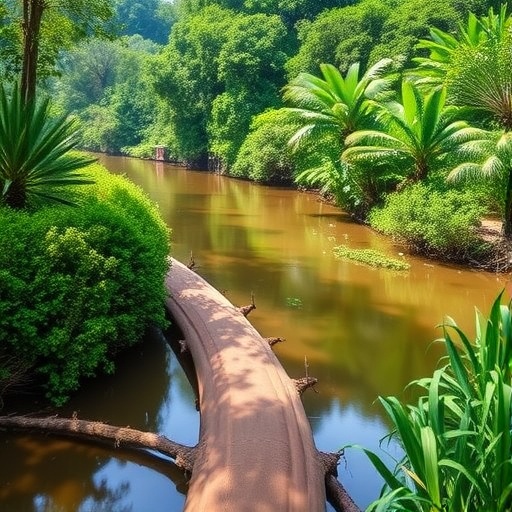In the heart of the Western Amazon lies a treasure trove of biodiversity and ecological significance. Recent research conducted by a team of scientists sheds light on the pressing need to evaluate the ecological integrity of the rivers that weave through this ecologically rich landscape. The study, led by experts in the field, provides a much-needed baseline for assessing the health of these vital waterways, emphasizing the urgent need for conservation efforts.
Rivers in the Western Amazon are not merely waterways; they are dynamic systems that host a plethora of species and serve as lifelines for both terrestrial and aquatic ecosystems. The Amazon River basin is characterized by its intricate web of rivers, which play a crucial role in maintaining ecological balance. However, human impact, including deforestation, pollution, and climate change, has put immense pressure on these ecosystems, leading to an existential threat to their integrity.
The researchers describe the multifaceted approach taken to assess the ecological integrity of the Western Amazon rivers. They utilized a combination of remote sensing, field surveys, and ecological modeling to gather comprehensive data. By employing these varied methodologies, the team aimed to capture the complex interactions within aquatic and terrestrial ecosystems, providing a holistic picture of river health.
Among the core objectives was to establish a baseline ecological assessment. This baseline is crucial not only for understanding the current state of the ecosystem but also for facilitating future conservation efforts. Without a clear benchmark, it becomes increasingly difficult to measure the impacts of environmental changes and restoration initiatives. The researchers emphasized that this baseline can serve as a critical tool for policymakers and conservationists alike.
One of the standout features of this study is its focus on the ecological indicators that signal river health. The researchers identified a range of biological, chemical, and physical indicators that could be monitored over time. For instance, changes in fish populations, water quality parameters, and sediment loads can provide vital insights into the ecological integrity of river systems. By tracking these indicators, scientists can develop a more nuanced understanding of how various stressors impact river ecosystems.
Moreover, the study highlights the interconnectedness of the Amazon’s rivers with the wider biodiversity of the region. Many species rely on healthy river systems for breeding, feeding, and migration. Disruptions to these waterways can therefore have cascading effects on the entire ecosystem. The research underscores the importance of safeguarding these rivers not just for their intrinsic ecological value, but also for the myriad species—including those that are endangered—that depend on them.
As the researchers delved deeper into the ecological assessments, they also uncovered alarming trends. Preliminary findings suggest that several river systems are showing signs of ecological degradation, including declining fish populations and diminished water quality. These changes are indicative of broader environmental stressors, such as agricultural runoff and increasing levels of pollutants. Such findings are a clarion call for urgent action to mitigate human impact on these vital ecosystems.
The implications of this research extend beyond the realm of academia; they resonate with local communities and indigenous populations who have relied on the rivers for generations. By establishing a scientific basis for ecological assessments, the study empowers these communities to advocate for their environmental rights and highlights the importance of traditional ecological knowledge. Engaging with local stakeholders is not just beneficial but necessary for the success of conservation initiatives, as these communities often hold a wealth of information about the rivers and their ecosystems.
In a time when climate change threatens ecosystems worldwide, the role of the Amazon’s rivers in carbon sequestration cannot be overstated. The research offers insight into how maintaining the health of these ecosystems can contribute to global climate goals. The preservation of rivers is not merely an environmental issue; it is intricately linked to efforts aimed at combating climate change, utilizing the services these ecosystems provide to mitigate carbon emissions.
Looking ahead, the authors advocate for a collaborative approach to river management, one that encompasses scientific research, community involvement, and policy changes. They contend that a multidisciplinary strategy is essential for creating effective conservation measures. This means integrating scientific findings into public policy, leveraging technology for real-time monitoring, and ensuring that local voices are heard in decision-making processes.
In conclusion, the findings of this study serve as a vital reminder of the delicate balance that sustains the rivers of the Western Amazon. As ecological threats loom on the horizon, such research is imperative for formulating effective responses and management strategies. By establishing a quantitative baseline for assessing ecological integrity, the researchers pave the way for future investigations, conservation efforts, and informed policy decisions aimed at protecting the intricate systems that define the Amazonian ecosystem.
In an era where environmental challenges are mounting, the research serves as a beacon of hope, demonstrating that with the right tools and collaborative spirit, we can aspire to safeguard the ecological treasures of the Amazon. The journey towards ecological restoration may be fraught with challenges, but it is also filled with opportunities for innovative solutions, community engagement, and a renewed commitment to preserving our planet’s most vital ecosystems.
As we stand on the precipice of ecological change, it is imperative that we heed the findings of such studies and work collectively to protect the rivers that not only sustain countless species but also hold the promise of a vibrant future for our planet. The time for action is now, and this research stands as a foundational step toward understanding and preserving the ecological integrity of the Western Amazon’s rivers.
Subject of Research: Ecological integrity of Western Amazon rivers
Article Title: A baseline for assessing the ecological integrity of Western Amazon rivers
Article References:
Anderson, E.P., Encalada, A.C., Couto, T.B.A. et al. A baseline for assessing the ecological integrity of Western Amazon rivers.
Commun Earth Environ 6, 623 (2025). https://doi.org/10.1038/s43247-025-02530-8
Image Credits: AI Generated
DOI: 10.1038/s43247-025-02530-8
Keywords: ecological integrity, Western Amazon, rivers, biodiversity, conservation, climate change, environmental policy.




